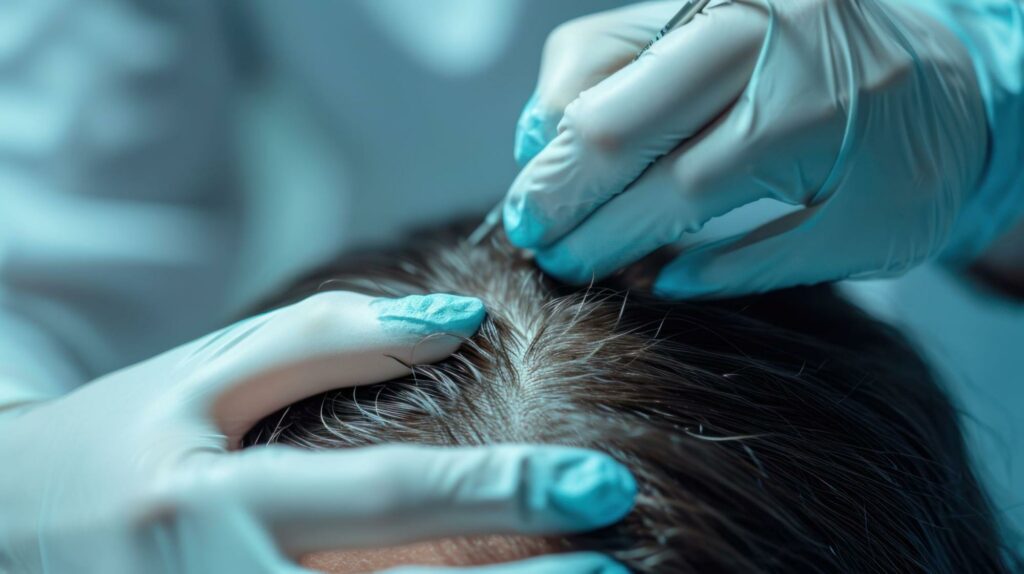Hair loss can be a distressing experience for anyone, but for women, it often comes with an added layer of emotional turmoil and self-consciousness. Female pattern hair loss (FPHL), also known as androgenetic alopecia, is a common condition that affects millions of women worldwide.
It typically presents as a diffuse thinning over the crown and top of the scalp, often starting with a widening part. Unlike male pattern baldness, which often results in complete baldness in specific areas, FPHL rarely leads to total hair loss. Despite its prevalence, many women feel isolated and unsure of how to address the issue.
Scroll deeper to learn more about the various hair loss treatments available for FPHL, aiming to empower women to regain control over their hair health and achieve stronger, fuller hair.
Understanding Female Pattern Hair Loss
FPHL is a complex condition with multiple contributing factors. The primary causes include hormonal changes, particularly sensitivity to androgens (male hormones that are present in both men and women), genetics, and aging.
Hormonal fluctuations, such as those occurring during menopause, can exacerbate the condition. Genetics play a significant role, with a family history of hair loss often being a strong predictor.
Aging naturally leads to a reduction in hair density and growth rate, which can contribute to the onset of FPHL. The progression of FPHL can be categorized into different stages, from mild thinning to more noticeable hair loss.
Typically, women will first notice a widening of the part in their hair or a reduction in the volume of their ponytail. As the condition advances, the scalp may become more visible through the thinning hair.
It is important for women experiencing these symptoms to consult a dermatologist or trichologist who can provide an accurate diagnosis and recommend a personalized treatment plan.
Exploring Treatment Options
Now that we understand the root causes of female pattern hair loss, here are the different treatment options available to help you achieve stronger, fuller hair:
Alma TED
If you’re considering hair restoration, Alma Ted might just be the game-changer you’ve been looking for. This cutting-edge device is designed to address hair loss through a non-invasive, pain-free procedure.
Unlike traditional methods like PRP, which involve injecting concentrated blood components, Alma Ted creates tiny microchannels in the scalp to enhance the delivery of topical solutions. Utilizing advanced acoustic sound waves and air pressure, the treatment invigorates your scalp and stimulates hair follicles, all without the need for needles or anesthesia.
Patients have reported significant improvements in hair density and quality, with virtually no downtime. You can walk out of the clinic and get right back to your day, making it an ideal choice for anyone eager to restore their hair effortlessly and effectively.
Topical Treatments
One of the most widely recognized and FDA-approved treatments for FPHL is Minoxidil. This topical medication is available in various strengths and is applied directly to the scalp. Minoxidil works by stimulating hair follicles, prolonging the growth phase of the hair cycle, and potentially increasing hair density and thickness.
While it doesn’t cure hair loss, consistent use can lead to significant improvements in hair growth. However, Minoxidil isn’t without its drawbacks. Some users may experience scalp irritation, itching, or dryness.
It is also important to note that results can take several months to become noticeable, and continuous application is necessary to maintain the benefits. Discontinuing the treatment often leads to a return of hair loss.
Oral Medications
Finasteride, a medication commonly used to treat male pattern baldness, is sometimes prescribed off-label for women with FPHL. This drug works by inhibiting the enzyme responsible for converting testosterone to dihydrotestosterone (DHT), a hormone that can shrink hair follicles and lead to hair loss.
While Finasteride can be effective, it is typically reserved for postmenopausal women due to the risk of birth defects if taken during pregnancy. Women considering Finasteride should consult their doctor to thoroughly discuss the potential risks and benefits.
Side effects can include decreased libido, mood changes, and other hormonal disruptions. It is important to weigh these factors against the potential for hair regrowth and improved density.
Platelet-Rich Plasma (PRP) Injection
Platelet-rich plasma (PRP) therapy is an innovative treatment that has shown promise in stimulating hair growth. PRP involves drawing a small amount of the patient’s blood, processing it to concentrate the platelets, and then injecting this platelet-rich plasma into the scalp.
The growth factors in the plasma can help rejuvenate hair follicles and promote new hair growth. While PRP is a relatively new treatment for FPHL, early studies and anecdotal evidence suggest it can be effective, especially when combined with other therapies.
The procedure is generally well-tolerated, with minimal downtime. However, multiple sessions are often required to achieve and maintain the best results.

At-Home Light Therapy Treatments
Low-level laser therapy (LLLT) is another option for women with FPHL, available through at-home devices such as laser combs or helmets. LLLT works by emitting light at specific wavelengths that penetrate the scalp and stimulate hair follicles, potentially promoting hair growth.
While LLLT is convenient and non-invasive, its long-term effectiveness for FPHL is still under research. Some users report positive results, while others may see minimal improvement. It is important for individuals to manage their expectations and understand that LLLT may work best as part of a comprehensive treatment plan rather than a standalone solution.
Lifestyle Strategies to Support Hair Health
In addition to medical treatments, adopting healthy lifestyle habits can significantly impact hair health and support hair growth. A balanced diet rich in essential nutrients, such as vitamins A, C, D, E, zinc, iron, and omega-3 fatty acids, is crucial for maintaining healthy hair. Foods like leafy greens, nuts, seeds, fish, and lean proteins can provide these necessary nutrients.
Stress management is another vital component of hair health. Chronic stress can lead to hair loss or worsen existing conditions. Techniques such as mindfulness meditation, yoga, regular exercise, and adequate sleep can help manage stress levels and promote overall well-being.
Lastly, maintaining proper scalp hygiene is essential. Regularly washing the scalp with a gentle shampoo can help keep hair follicles clear of debris and excess oil, reducing the risk of follicle inflammation and supporting healthier hair growth.
Managing Expectations and Maintaining Results
When embarking on a treatment plan for FPHL, it is important to set realistic expectations. Complete hair regrowth may not always be achievable, but significant improvement in hair density and thickness is possible with consistent treatment.
Patients should understand that results can take several months to become noticeable and that ongoing maintenance is often required to sustain the benefits. Adhering to the prescribed treatment regimen and following up with regular check-ups with our provider are key to maintaining results.
Our experts can monitor progress, adjust treatment plans as necessary, and address any side effects or concerns.
Female pattern hair loss can be a challenging and emotional experience, but with the right treatment approach, women can regain control over their hair health.
From topical treatments like Minoxidil to innovative options like PRP therapy, there are multiple pathways to explore for those seeking to improve hair density and achieve stronger, fuller hair.
Combining medical treatments with healthy lifestyle habits and realistic expectations can lead to significant improvements and renewed confidence.
At Dr. Chow’s Rejuvenation Practice in Lee’s Summit, MO, we are committed to providing personalized care and effective solutions for FPHL. Our experienced team of experts will work with you to develop a tailored hair loss treatment plan that addresses your unique needs and goals.
Call us now to schedule a consultation today and start your journey toward healthier, more confident hair!
Need a financing option?

Buy Now, Pay Monthly. Let your money go further and take better control of your cash flow when you pay in smaller, more maneagble monthly installments with PatientFi.
Click the link below to learn more about and how it can help you reach your goals


